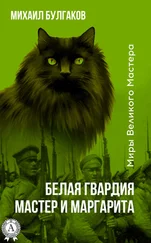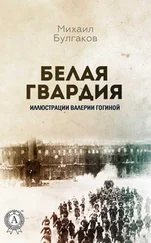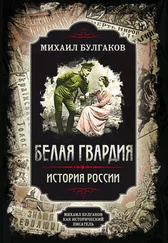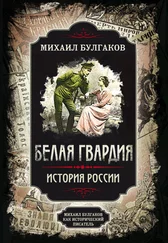| Talberg said: |
И Тальберг сказал: |
| ' I must go at once. |
- Нужно ехать сию минуту. |
| The train leaves at one o'clock tonight . . .' |
Поезд идет в час ночи... |
| Half an hour later everything in the room with the falcon had been turned upside down. |
...Через полчаса все в комнате с соколом было разорено. |
| A trunk stood on the floor, its padded inner lid wide open. |
Чемодан на полу и внутренняя матросская крышка его дыбом. |
| Elena, looking drawn and serious, wrinkles at the corners of her mouth, was silently packing the trunk with shirts, underclothes and towels. |
Елена, похудевшая и строгая, со складками у губ, молча вкладывала в чемодан сорочки, кальсоны, простыни. |
| Kneeling down, Talberg was fumbling with his keys at the bottom drawer of the chest-of-drawers. |
Тальберг, на коленях у нижнего ящика шкафа, ковырял в нем ключом. |
| Soon the room had that desolate look that comes from the chaos of packing up to go away and, worse, from removing the shade from the lamp. |
А потом... потом в комнате противно, как во всякой комнате, где хаос укладки, и еще хуже, когда абажур сдернут с лампы. |
| Never, never take the shade off a lamp. |
Никогда. Никогда не сдергивайте абажур с лампы! |
| A lampshade is something sacred. |
Абажур священен. |
| Scuttle away like a rat from danger and into the unknown. |
Никогда не убегайте крысьей побежкой на неизвестность от опасности. |
| Read or doze beside your lampshade; let the storm howl outside and wait until they come for you. |
У абажура дремлите, читайте - пусть воет вьюга, -ждите, пока к вам придут. |
| Talberg was running away. |
Тальберг же бежал. |
| He straightened up, trampling on the pieces of torn paper littered around the heavy, closed trunk. He was fully dressed in his long greatcoat, neat black fur cap with ear-muffs and gray-blue Hetmanite badge, his sword belted to his side. |
Он возвышался, попирая обрывки бумаги, у застегнутого тяжелого чемодана в своей длинной шинели, в аккуратных черных наушниках, с гетманской серо-голубой кокардой и опоясан шашкой. |
| On the long-distance departure track of the City's No. 1 Passenger Station the train was already standing, though still without a locomotive, like a caterpillar without a head. |
На дальнем пути Города I, Пассажирского уже стоит поезд - еще без паровоза, как гусеница без головы. |
| It was made up of nine cars, all shining with blindingly white electric light, due to leave at 1 a.m. carrying General von Bussow and his headquarters staff to Germany. |
В составе девять вагонов с ослепительно-белым электрическим светом. В составе в час ночи уходит в Германию штаб генерала фон Буссова. |
| They were taking Talberg with them; he had influence in the right quarters . . . |
Тальберга берут: у Тальберга нашлись связи... |
| The Hetman's ministry was a stupid, squalid little comic opera affair (Talberg liked to express himself in cutting, if unoriginal terms) - like the Hetman himself, for that matter. |
Гетманское министерство - это глупая и пошлая оперетка (Тальберг любил выражаться тривиально, но сильно, как, впрочем, и сам гетман. |
| All the more squalid because . . . |
Тем более пошлая, что... |
| 'Look, my dear (whisper) the Germans are leaving the Hetman in the lurch and it's extremely likely that Petlyura will march in ... and you know what that means . . .' |
- Пойми (шепот), немцы оставляют гетмана на произвол судьбы, и очень, очень может быть, что Петлюра войдет... а это, знаешь ли... |
| Elena knew what that meant. |
О, Елена знала! |
| Elena knew very well. |
Елена отлично знала. |
| In March 1917 Talberg had been the first - the first, you realise - to report to the military academy wearing a broad red armband. |
В марте 1917 года Тальберг был первый, -поймите, первый, - кто пришел в военное училище с широченной красной повязкой на рукаве. |
| That was in the very first days of the revolution, when all the officers in the City turned to stone at the news from Petersburg and crept away down dark passages to avoid hearing about it. |
Это было в самых первых числах, когда все еще офицеры в Городе при известиях из Петербурга становились кирпичными и уходили куда-то, в темные коридоры, чтобы ничего не слышать. |
| As a member of the Revolutionary Military Committee it had been none other than Talberg who had arrested the famous General Petrov. |
Тальберг как член революционного военного комитета, а не кто иной, арестовал знаменитого генерала Петрова. |
| Towards the end of that momentous year many strange and wonderful things happened in the City and certain people began appearing -people who had no boots but who wore broad, baggy Ukrainian trousers called sharovary which showed beneath their army greatcoats. These people announced that they would not leave the City for the front on any account because the fighting was none of their affair and they intended to stay in the City. This irritated Talberg, who declared curtly that this was not what was required, that it was a squalid comic opera. |
Когда же к концу знаменитого года в Городе произошло уже много чудесных и странных событий и родились в нем какие-то люди, не имеющие сапог, но имеющие широкие шаровары, выглядывающие из-под солдатских серых шинелей, и люди эти заявили, что они не пойдут ни в коем случае из Города на фронт, потому что на фронте им делать нечего, что они останутся здесь, в Городе, Тальберг сделался раздражительным и сухо заявил, что это не то, что нужно, пошлая оперетка. |
| And to a certain extent he turned out to be right: the results were operatic, though so much blood was shed that they were hardly comic. |
И он оказался до известной степени прав: вышла действительно оперетка, но не простая, а с большим кровопролитием. |
| The men in baggy trousers were twice driven out of the City by some irregular regiments of troops who emerged from the forests and the plains from the direction of Moscow. |
Людей в шароварах в два счета выгнали из Города серые разрозненные полки, которые пришли откуда-то из-за лесов, с равнины, ведущей к Москве. |
| Talberg said that the men in sharovary were mere adventurers and that the real roots of legitimate power were in Moscow, even though these roots were Bolshevik roots. |
Тальберг сказал, что те в шароварах -авантюристы, а корни в Москве, хоть эти корни и большевистские. |
| But one day in March the Germans arrived in the City in their gray ranks, with red-brown tin bowls on their heads to protect them from shrapnel balls; and their hussars wore such fine busbies and rode on such magnificent horses that Talberg at once realised where the roots of power grew now. |
Но однажды, в марте, пришли в Город серыми шеренгами немцы, и на головах у них были рыжие металлические тазы, предохранявшие их от шрапнельных пуль, а гусары ехали в таких мохнатых шапках и на таких лошадях, что при взгляде на них Тальберг сразу понял, где корни. |
| After a few heavy salvoes from the German artillery around the City the men from Moscow vanished somewhere beyond the blue line of the forests to cat carrion, and the men in sharovary slunk back in the wake of the Germans. |
После нескольких тяжелых ударов германских пушек под Городом московские смылись куда-то за сизые леса есть дохлятину, а люди в шароварах притащились обратно, вслед за немцами. |




![Михаил Булгаков - Белая гвардия [litres; с иллюстрациями В. Гогиной]](/books/400111/mihail-bulgakov-belaya-gvardiya-litres-s-illyustrac-thumb.webp)
